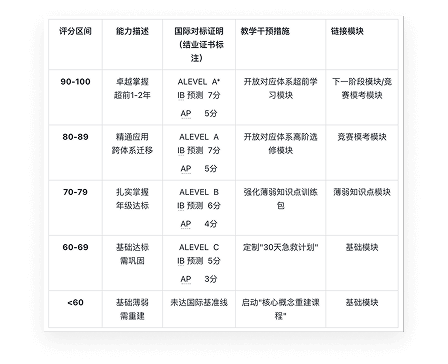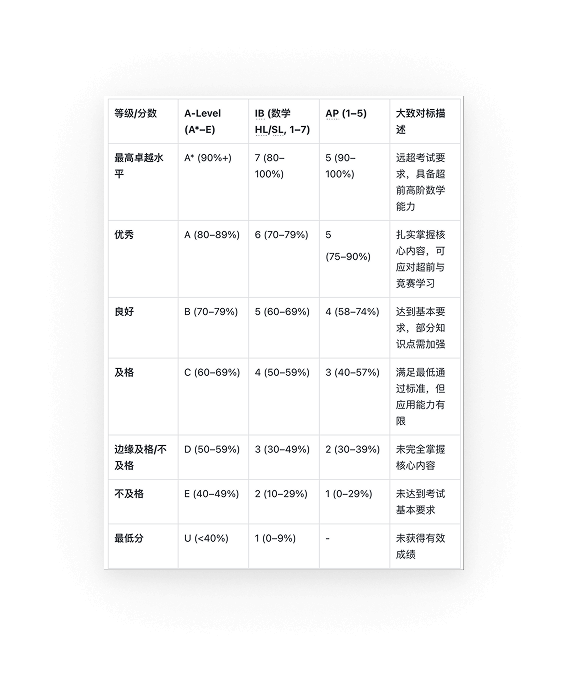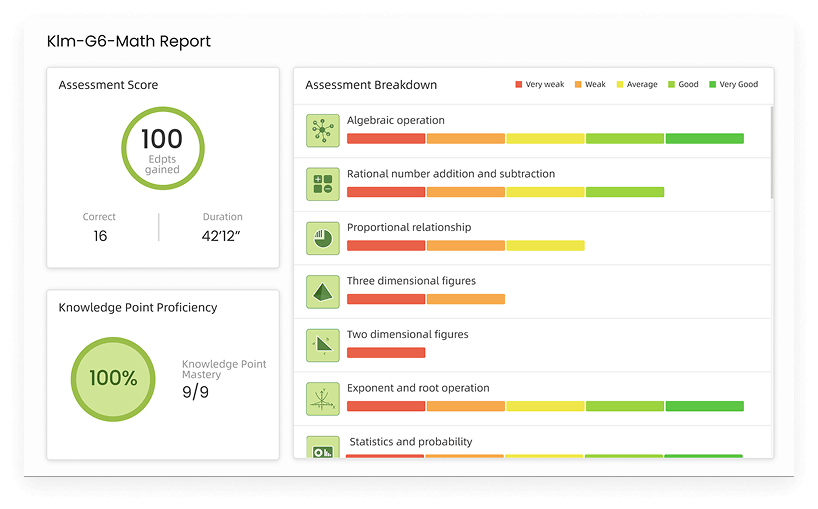Learning I-Land Math Assessment System
......
Expand Content

G1
G2
G3
Start Assessment
Passing Benchmark (80 points) Evaluation Logic
Numerical Sense & Operations Dimension:
 Focused on strengthening the foundational numerical sense and arithmetic skills for G1-G3 students, this section requires students to complete a question bank on numerical operations. The question bank is designed around two-digit addition/subtraction and simple mental multiplication/division, aiming to reinforce students' mastery of basic arithmetic rules through repeated practice. This enhances their mental calculation speed and accuracy, ensuring they possess the essential operational skills required for competitions, which serve as the foundational ability for further contest participation.
Focused on strengthening the foundational numerical sense and arithmetic skills for G1-G3 students, this section requires students to complete a question bank on numerical operations. The question bank is designed around two-digit addition/subtraction and simple mental multiplication/division, aiming to reinforce students' mastery of basic arithmetic rules through repeated practice. This enhances their mental calculation speed and accuracy, ensuring they possess the essential operational skills required for competitions, which serve as the foundational ability for further contest participation.Spatial Reasoning Dimension:
 Tailored to the spatial cognitive development of G1-G3 students, the passing benchmark is set as "completing the spatial reasoning question bank." The question bank is based on concepts such as shape rotation and symmetry, guiding students to observe, imagine, and analyze geometric transformations. This helps them gradually build preliminary Olympiad-level geometric thinking, familiarize themselves with the basic logic of spatial relationships, and develop the cognitive foundation needed for geometry-related problems in competitions, enabling them to meet the initial spatial reasoning demands of contests.
Tailored to the spatial cognitive development of G1-G3 students, the passing benchmark is set as "completing the spatial reasoning question bank." The question bank is based on concepts such as shape rotation and symmetry, guiding students to observe, imagine, and analyze geometric transformations. This helps them gradually build preliminary Olympiad-level geometric thinking, familiarize themselves with the basic logic of spatial relationships, and develop the cognitive foundation needed for geometry-related problems in competitions, enabling them to meet the initial spatial reasoning demands of contests.Logical Thinking Dimension:
 Rooted in logical enlightenment for G1-G3 students, the passing benchmark is assessed through "mathematical model-based logic puzzle tests." Logic puzzles such as beginner Sudoku and pattern-filling exercises avoid complex calculations, instead emphasizing logical reasoning and pattern discovery. By solving these puzzles, students hone analytical, inductive, and deductive thinking skills, reflecting their non-computational cognitive abilities and laying a solid logical foundation for reasoning-based questions in competitions.
Rooted in logical enlightenment for G1-G3 students, the passing benchmark is assessed through "mathematical model-based logic puzzle tests." Logic puzzles such as beginner Sudoku and pattern-filling exercises avoid complex calculations, instead emphasizing logical reasoning and pattern discovery. By solving these puzzles, students hone analytical, inductive, and deductive thinking skills, reflecting their non-computational cognitive abilities and laying a solid logical foundation for reasoning-based questions in competitions.Competition Advancement Signal Evaluation Logic
Numerical Sense & Operations Dimension:
 The "Unlock Competition Test" serves as the advancement benchmark, indicating that the student has met the entry-level requirements for competition through the foundational question bank training. The competition test will expand arithmetic scenarios and increase complexity, assessing whether students can flexibly apply basic operations to solve more challenging competition problems. This helps identify students whose computational skills align with the pace of competitive contests.
The "Unlock Competition Test" serves as the advancement benchmark, indicating that the student has met the entry-level requirements for competition through the foundational question bank training. The competition test will expand arithmetic scenarios and increase complexity, assessing whether students can flexibly apply basic operations to solve more challenging competition problems. This helps identify students whose computational skills align with the pace of competitive contests.Spatial Reasoning Dimension:
 The "Unlock Competition Test" serves as the advancement benchmark, indicating that the student has met the entry-level requirements for competition through the foundational question bank training. The competition test will expand arithmetic scenarios and increase complexity, assessing whether students can flexibly apply basic operations to solve more challenging competition problems. This helps identify students whose computational skills align with the pace of competitive contests.
The "Unlock Competition Test" serves as the advancement benchmark, indicating that the student has met the entry-level requirements for competition through the foundational question bank training. The competition test will expand arithmetic scenarios and increase complexity, assessing whether students can flexibly apply basic operations to solve more challenging competition problems. This helps identify students whose computational skills align with the pace of competitive contests.Logical Thinking Dimension:
 Rooted in logical enlightenment for G1-G3 students, the passing benchmark is assessed through "mathematical model-based logic puzzle tests." Logic puzzles such as beginner Sudoku and pattern-filling exercises avoid complex calculations, instead emphasizing logical reasoning and pattern discovery. By solving these puzzles, students hone analytical, inductive, and deductive thinking skills, reflecting their non-computational cognitive abilities and laying a solid logical foundation for reasoning-based questions in competitions.
Rooted in logical enlightenment for G1-G3 students, the passing benchmark is assessed through "mathematical model-based logic puzzle tests." Logic puzzles such as beginner Sudoku and pattern-filling exercises avoid complex calculations, instead emphasizing logical reasoning and pattern discovery. By solving these puzzles, students hone analytical, inductive, and deductive thinking skills, reflecting their non-computational cognitive abilities and laying a solid logical foundation for reasoning-based questions in competitions.








